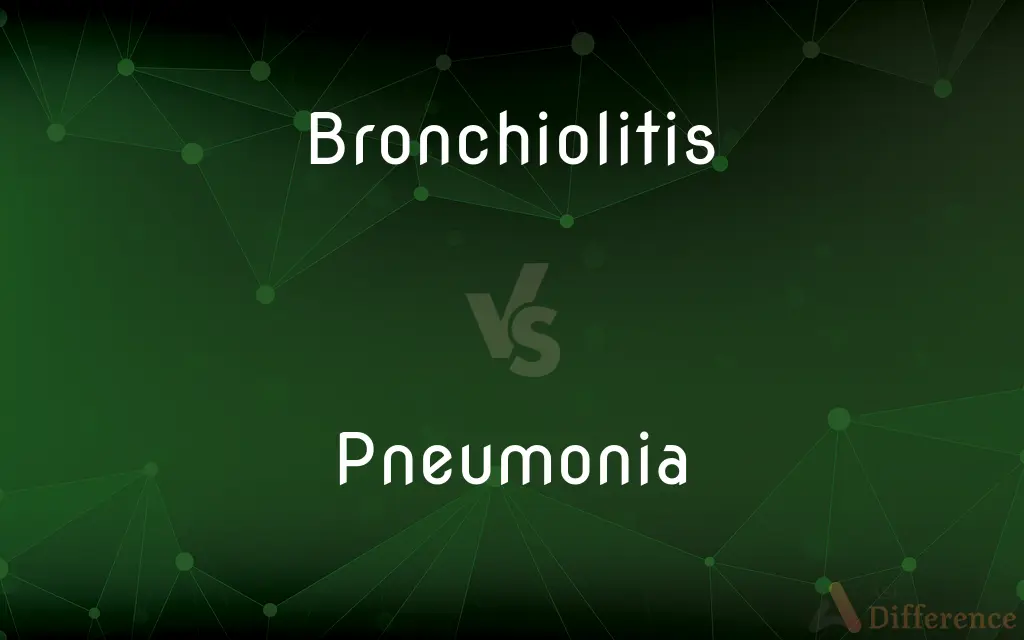Bronchiolitis vs. Pneumonia — What's the Difference?
By Tayyaba Rehman — Updated on September 27, 2023
Bronchiolitis is an inflammatory respiratory condition primarily affecting the bronchioles, common in infants. Pneumonia is an infection inflaming the air sacs in one or both lungs, potentially filling them with fluid or pus, affecting individuals.

Difference Between Bronchiolitis and Pneumonia
Table of Contents
ADVERTISEMENT
Key Differences
Bronchiolitis and Pneumonia are both respiratory conditions but differ in their etiology, affected population, and affected anatomical regions. Bronchiolitis is primarily an inflammation of the bronchioles, the smaller air passages in the lungs, typically caused by a viral infection, and is most common in infants and young children. In contrast, Pneumonia is an inflammatory condition affecting the alveoli in the lungs and can be caused by a variety of pathogens including bacteria, viruses, or fungi, affecting individuals of all ages.
Bronchiolitis typically manifests with symptoms such as wheezing, cough, and shortness of breath, usually following upper respiratory symptoms like runny nose and sometimes fever. On the other hand, Pneumonia often presents more severely with high fever, cough with phlegm, shortness of breath, and chest pain, and it can be life-threatening if not treated promptly, especially in high-risk populations like the elderly or immunocompromised individuals.
In terms of diagnosis, Bronchiolitis is often diagnosed clinically, with supportive care being the mainstay of treatment. Conversely, Pneumonia requires a more extensive diagnostic workup including imaging and possibly microbiological testing, and the treatment usually involves antibiotics, antivirals, or antifungals depending on the underlying cause, in addition to supportive care.
The occurrence of Bronchiolitis is often linked to exposure to Respiratory Syncytial Virus (RSV) and is mostly seen in winter months. Pneumonia can occur sporadically throughout the year and can be secondary to various pathogens, with Streptococcus pneumoniae being a common bacterial cause.
While Bronchiolitis and Pneumonia share the common ground of being respiratory ailments, they distinctly vary in their manifestation, management, and prognosis, necessitating appropriate medical intervention and, in the case of pneumonia, often requiring more aggressive and immediate treatment strategies to prevent complications.
ADVERTISEMENT
Comparison Chart
Definition
Inflammation of the bronchioles, usually due to a viral infection.
Infection of the lungs affecting the alveoli, caused by bacteria, viruses, or fungi.
Affected Demographic
Primarily infants and young children.
Individuals of all ages.
Symptoms
Wheezing, cough, shortness of breath, mild fever.
High fever, productive cough, chest pain, severe shortness of breath.
Treatment
Supportive care, hydration, and monitoring.
Antibiotics, antivirals, or antifungals, plus supportive care depending on the cause.
Occurrence
Often linked to RSV, predominantly in winter months.
Can occur throughout the year, sporadically, due to various pathogens.
Compare with Definitions
Bronchiolitis
Usually self-limiting requiring supportive care and management.
The toddler with bronchiolitis was given fluids and monitored for any signs of distress.
Pneumonia
Can be caused by various pathogens including bacteria, viruses, and fungi.
The pneumonia was traced back to a viral origin, altering the treatment approach.
Bronchiolitis
An inflammation typically characterized by wheezing and difficulty in breathing.
The child's bronchiolitis was evidenced by his persistent cough and audible wheezing.
Pneumonia
Often presents with high fever, cough producing phlegm, and shortness of breath.
The patient's persistent high fever and productive cough were indicative of pneumonia.
Bronchiolitis
Diagnosed primarily based on clinical symptoms and patient history.
The pediatrician diagnosed bronchiolitis after assessing the baby’s respiratory symptoms and recent exposure to sick contacts.
Pneumonia
Diagnosed through clinical examination, imaging studies, and sometimes microbiological testing.
The diagnosis of pneumonia was confirmed through a chest X-ray showing infiltrates in the lungs.
Bronchiolitis
A respiratory illness affecting the bronchioles in the lungs, primarily in infants.
The baby was admitted due to severe bronchiolitis caused by a viral infection.
Pneumonia
An inflammatory lung condition affecting the alveoli, potentially causing them to fill with fluid.
The elderly man was hospitalized with bacterial pneumonia, requiring immediate antibiotic treatment.
Bronchiolitis
Often associated with Respiratory Syncytial Virus (RSV) infection.
The prevalence of bronchiolitis increases during RSV season in the winter months.
Pneumonia
Requires medical intervention, including antibiotics and, in severe cases, hospitalization.
The severe case of pneumonia necessitated intravenous antibiotics and respiratory support.
Bronchiolitis
Bronchiolitis is blockage of the small airways in the lungs due to a viral infection. It usually only occurs in children less than two years of age.
Pneumonia
Pneumonia is an inflammatory condition of the lung primarily affecting the small air sacs known as alveoli. Symptoms typically include some combination of productive or dry cough, chest pain, fever and difficulty breathing.
Bronchiolitis
(pathology) Inflammation of the bronchioles; especially common in young children.
Pneumonia
Lung inflammation caused by bacterial or viral infection, in which the air sacs fill with pus and may become solid. Inflammation may affect both lungs (double pneumonia) or only one (single pneumonia).
Bronchiolitis
Inflammation of the membranes lining the bronchioles.
Pneumonia
An acute or chronic disease marked by inflammation of the lungs, usually caused by a bacterium, virus, or other infectious agent.
Bronchiolitis
Inflammation of the membranes lining the bronchioles
Pneumonia
An acute or chronic inflammation of the lungs caused by viruses, bacteria or other microorganisms, or sometimes by physical or chemical irritants.
Pneumonia
Inflammation of the lungs.
Pneumonia
Respiratory disease characterized by inflammation of the lung parenchyma (excluding the bronchi) with congestion caused by viruses or bacteria or irritants
Common Curiosities
Is RSV the only cause of bronchiolitis?
No, while RSV is a common cause, other viruses like rhinovirus can also cause bronchiolitis.
Is bronchiolitis contagious?
Yes, bronchiolitis is typically contagious and is usually caused by a virus.
Can adults get bronchiolitis?
While rare, adults, especially those with weakened immune systems, can get bronchiolitis.
Can pneumonia lead to sepsis?
Yes, untreated or severe pneumonia can lead to sepsis, a life-threatening condition.
Is there a specific treatment for bronchiolitis?
Treatment for bronchiolitis is mainly supportive, focusing on relieving symptoms.
Can pneumonia be caused by COVID-19?
Yes, COVID-19 can cause viral pneumonia, particularly in severe cases.
How is pneumonia diagnosed?
Diagnosis usually involves clinical evaluation, chest X-rays, and sometimes, sputum culture or blood tests.
Is bronchiolitis a chronic condition?
No, bronchiolitis is typically an acute condition, predominantly affecting infants.
Can bronchiolitis recur?
While it's uncommon, some children may experience more than one episode of bronchiolitis.
Does bronchiolitis have long-term effects?
Most children recover fully, but some may have recurrent wheezing in the future.
Is pneumonia vaccination available?
Yes, there are vaccines available for some of the common bacterial causes of pneumonia.
Can pneumonia be prevented?
Pneumonia can be prevented through vaccination, good hygiene, and a healthy lifestyle.
Is pneumonia more severe than bronchiolitis?
Generally, pneumonia can be more severe and life-threatening than bronchiolitis.
Can bronchiolitis lead to asthma?
While there is a correlation, it's not clear if bronchiolitis directly causes the development of asthma.
What is the recovery time for pneumonia?
Recovery can take a few weeks but might be longer in severe cases or in those with other health conditions.
Share Your Discovery

Previous Comparison
Plasmolysis vs. Turgidity
Next Comparison
Barracuda vs. PikeAuthor Spotlight
Written by
Tayyaba RehmanTayyaba Rehman is a distinguished writer, currently serving as a primary contributor to askdifference.com. As a researcher in semantics and etymology, Tayyaba's passion for the complexity of languages and their distinctions has found a perfect home on the platform. Tayyaba delves into the intricacies of language, distinguishing between commonly confused words and phrases, thereby providing clarity for readers worldwide.
















































